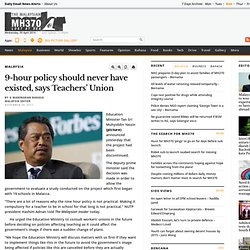

Malaysia Education One Stop Centre. Ten Skills Every Student Should Learn. Teachers’ union says no to 9-hour policy @ Sun Nov 13 2011. By G. Manimaran KUALA LUMPUR, Nov 13 – The National Union of the Teaching Profession (NUTP) today urged Putrajaya to revoke the nine hours a day teaching policy for school teachers, as a study has shown it was not beneficial. NUTP also said that the new policy was not suitable at the moment as many schools lack comfortable facilities for teachers. The new policy will be implemented January 2012 onwards in four states – Melaka, Sarawak, Pahang and Johor – and will affect about 5,000 teachers from primary and secondary institutions.
NUTP president Hashim Adnan the new policy would not bring positive results if school facilities and workload of the teachers were considered. “Moreover, teachers are not compelled to work nine hours a day like other services. Hashim added that the policy was not popular among teachers, therefore “why should the government go ahead with it?” He explained that the education ministry should conduct a study before implementing the policy. 9-hour policy should never have existed, says Teachers’ Union @ Sun Nov 20 2011. Education Minister Tan Sri Muhyiddin Yassin (picture) announced yesterday that the project had been discontinued.

The deputy prime minister said the decision was made in order to allow the government to evaluate a study conducted on the project which first began with 19 schools in Malacca. “There are a lot of reasons why the nine hour policy is not practical. Making it compulsory for a teacher to be in school for that long is not practical,” NUTP president Hashim Adnan told The Malaysian Insider today. He urged the Education Ministry to consult workers’ unions in the future before deciding on policies affecting teaching as it could affect the government’s image if there was a sudden change of plans. “We hope the Education Ministry will discuss matters with us first if they want to implement things like this in the future to avoid the government’s image being affected if policies like this are cancelled before they are actually implemented,” Adnan said.
Why Do Some People Learn Faster? The physicist Niels Bohr once defined an expert as “a person who has made all the mistakes that can be made in a very narrow field.”

Bohr’s quip summarizes one of the essential lessons of learning, which is that people learn how to get it right by getting it wrong again and again. Education isn’t magic. Education is the wisdom wrung from failure. A new study, forthcoming in Psychological Science, and led by Jason Moser at Michigan State University, expands on this important concept. The question at the heart of the paper is simple: Why are some people so much more effective at learning from their mistakes? The Moser experiment is premised on the fact that there are two distinct reactions to mistakes, both of which can be reliably detected using electroenchephalography, or EEG. The second signal, which is known as error positivity (Pe), arrives anywhere between 100-500 milliseconds after the mistake and is associated with awareness. Image: mujalifah/Flickr.
Gender Gap Vanishes in Female-Empowered Cultures. Twelve Things You Were Not Taught in School About Creative Thinking.